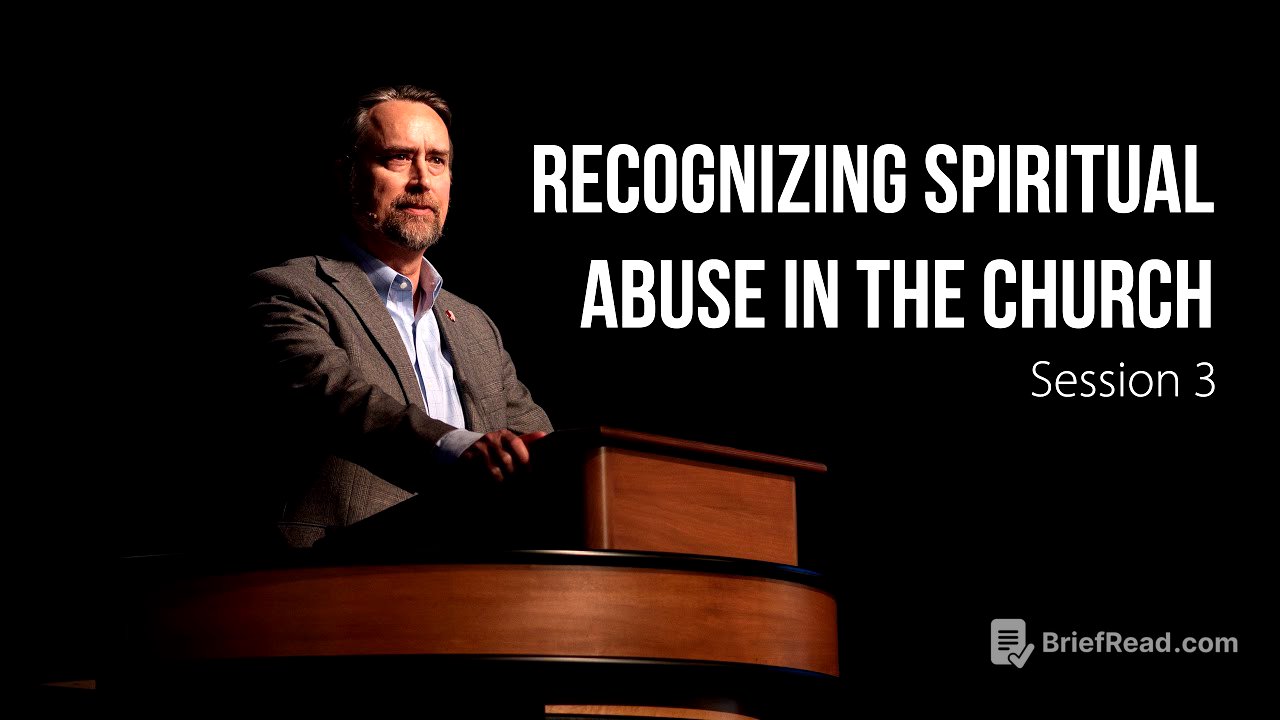TLDR;
This session focuses on how to prevent spiritual abuse in ministries by adopting five key principles. It emphasizes the importance of self-reflection and proactive measures to ensure ministries remain healthy and avoid sliding into abusive practices. The principles discussed are character over competency, teamwork over hierarchy, transparency over secrecy, shepherding over fault-finding, and openness over defensiveness.
- Character over competency
- Teamwork over hierarchy
- Transparency over secrecy
- Shepherding over fault-finding
- Openness over defensiveness
Introduction [0:01]
The speaker transitions from diagnosing spiritual abuse to focusing on preventing it in our own ministries. He stresses that many spiritually abusive leaders didn't start with bad intentions but gradually slid into unhealthy patterns. The aim is to provide prospective guidance to ensure ministries do not become prone to spiritual abuse.
The Dragon Eustace Analogy [0:25]
Using the illustration of Eustace from C.S. Lewis's "The Voyage of the Dawn Treader," the speaker highlights how individuals can unknowingly transform into something they never intended to be. Eustace, initially a cranky character, turns into a dragon without realizing it, symbolizing how leaders can gradually adopt abusive behaviors without recognizing their own transformation. The story encourages self-reflection and awareness to avoid becoming the "bad guy" without realizing it.
Five Principles to Avoid Spiritual Abuse [6:18]
The speaker introduces five principles to guide ministries away from unhealthy paths, applicable both personally and institutionally. These principles aim to help leaders and their churches avoid sliding into spiritually abusive practices.
Character Over Competency [8:06]
The first principle emphasizes prioritizing character over competency. The speaker critiques the "franchise player model" in churches, where exceptionally talented individuals become the center of everything, often overshadowing the importance of character. This model can lead to indispensable leaders who are difficult to challenge, even when character flaws are evident. Drawing from 1 Timothy 3, the speaker notes that most qualifications for ministers focus on character rather than competency, highlighting the need to restore character to its rightful place of importance.
Teamwork Over Hierarchy [21:08]
The second principle advocates for teamwork over hierarchy. While acknowledging the reality of Church and pastoral authority, the speaker cautions against adopting worldly models of leadership, such as those of military leaders, football coaches, and CEOs. These models often lead to top-down, hierarchical structures that stifle teamwork and can result in problematic trends. Instead, the speaker suggests a team-based approach, where leaders lead by persuasion and patience, bringing people along rather than issuing orders and cutting off those who don't comply.
Transparency Over Secrecy [28:51]
The third principle promotes transparency over secrecy. The speaker notes that in many abuse cases, the response to the abuse is often more problematic than the abuse itself, with churches silencing, minimizing, and covering up challenges. While acknowledging the need for wisdom and confidentiality in certain matters, the speaker argues for greater transparency in church business, suggesting that Elder meetings could be open to church members to foster accountability and trust.
Shepherding Over Fault Finding [36:52]
The fourth principle encourages shepherding over fault-finding. The speaker critiques the approach of focusing primarily on identifying and confronting people's sins, arguing that the job of a shepherd is multi-dimensional, involving care, feeding, protection, and encouragement. He warns against the tendency to control people by constantly pointing out their flaws and weaknesses, which can lead to a Ministry of fault-finding. Instead, he advocates for looking for evidence of God's grace in people's lives and encouraging them.
Openness Over Defensiveness [46:05]
The fifth principle emphasizes openness over defensiveness. The speaker acknowledges that Ministry is hard and that leaders will inevitably face critique. He warns against responding defensively to criticism, which can trigger abusive behavior as leaders try to control critique and protect their Ministry. Drawing from Joel Brown's comments on Mark Driscoll, the speaker suggests that a fear of losing their Ministry often underlies abusive leaders' behavior. He concludes by urging leaders to embrace the gospel and be willing to give up their lives for their sheep, rather than trying to save them.
Q&A - Manipulation and Structural Changes [52:56]
The speaker addresses a question about dealing with abuse perpetuated through established hierarchies and coalitions. He identifies two forms of manipulation used by abusive pastors: relational and structural. He emphasizes the difficulty of holding such leaders accountable and suggests rethinking how Elders are selected and diversifying Elder boards to ensure broader accountability.
Q&A - Balancing Gentleness and Strength [58:44]
The speaker answers a question about balancing gentleness with strength in leadership, referencing an article by Andrew Wilson on being gentle without being a doormat. He stresses that both strength and gentleness are necessary, and the absence of one can lead to problems.
Q&A - Burden of Proof in Abuse Cases [1:00:50]
In response to a question about the burden of proof in spiritual and sexual abuse cases, the speaker suggests that denominations need to update their policies to address the unique challenges posed by abuse cases. He proposes considering a level of evidence similar to that in civil cases rather than criminal cases.
Q&A - Introverted Abusive Pastors [1:03:56]
The speaker discusses the characteristics of abusive pastors who are introverted or passive, noting that abuse can manifest subtly through tactics like the "cold shoulder" or manipulating others in the background. He emphasizes that the high-profile cases of loud, aggressive leaders should not be the only image of spiritual abuse.
Q&A - Confront or Leave Abusive Situations [1:06:25]
The speaker addresses the difficult decision of whether to confront or leave an abusive church situation. He shares a story of someone who was threatened and fired for complaining, highlighting the lack of a clear path for victims of spiritual abuse. He advises seeking counsel from trusted individuals and acknowledges that sometimes the best option is to lick your wounds and move on.
Q&A - Spiritual Abuse in Marriages [1:10:18]
The speaker confirms that spiritual abuse can occur in marriages when a husband misuses his Spiritual Authority to berate, insult, and demean his wife. He notes that Elder boards should be aware of this possibility.
Q&A - Recommendations for Leadership Books [1:12:23]
The speaker recommends Paul Tripp's book "Lead" as a helpful resource for Christian leadership, noting that it addresses many of the same leadership problems discussed in the session.
Q&A - Bully Pew Abuse [1:14:34]
The speaker declines to write a book on "bully Pew abuse," where the congregation abuses the pastor. He shares that his next book project is a technical monograph on early Christian manuscripts.
Q&A - Susceptibility to Bully Leaders [1:15:39]
The speaker discusses whether certain personality types are more susceptible to bully leaders, noting that while some may be quicker to acknowledge and follow Authority, abuse is non-discriminatory and can affect various types of people.
Q&A - Redemption and Reinstatement for Abusers [1:17:44]
The speaker addresses the path of redemption and reinstatement for spiritually abusive leaders. He emphasizes the need for full ownership, repentance, and a willingness to work with the church body. While acknowledging that abuse disqualifies them from Ministry, he suggests that a slow path back may be possible after genuine repentance and recovery.
Q&A - Social Media and Abuse [1:20:44]
The speaker discusses the use of social media in addressing abuse, reiterating that individuals should first go through proper channels. However, he acknowledges that when those channels fail, people may feel obligated to go public to protect others. He emphasizes the need for self-reflection within the church to address why the system is not working for many victims.
Q&A - Non-Disclosure Agreements [1:23:33]
The speaker expresses strong opposition to non-disclosure agreements (NDAs) given to employees fired from Christian Ministries. He views them as a non-Christian way of thinking and acting, as they often force individuals to choose between financial stability and calling out abuse.
Q&A - Neglect as Spiritual Abuse [1:25:24]
The speaker considers whether neglect can be a form of spiritual abuse, suggesting that while it may be poor pastoring, it may not qualify as abuse unless it is a form of the "cold shoulder" tactic used to isolate and turn others against a person.
Q&A - Reconciliation Process [1:26:34]
The speaker expresses concerns about the reconciliation process often proposed to victims when there is not full ownership or repentance from the abuser. He notes that many reconciliation systems may not be fully aware of the complexities of abuse scenarios and may rush victims through ill-conceived processes.
Q&A - Evaluating Ministries with Both Good and Damage [1:29:10]
The speaker discusses how to evaluate Ministries that have both positive outcomes and a trail of Carnage. He notes that the push for church planting has sometimes attracted leaders who are not always the best Shepherds. While acknowledging the good that may have been done, he emphasizes the need to rethink leadership and work towards healthier Church models.


![Old Doctors: We MIXED BLACK SEED OIL & HONEY to Treat 19 Problems [After 60]](https://wm-img.halpindev.com/p-briefread_c-10_b-10/urlb/aHR0cDovL2ltZy55b3V0dWJlLmNvbS92aS9KNVVhZDBJeFp3RS9ocWRlZmF1bHQuanBn.jpg)





